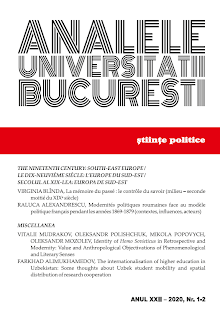Identity of Homo Sovieticus in Retrospective and Modernity: Value and Anthropological Objectivations of Phenomenological and Literary Senses
Identity of Homo Sovieticus in Retrospective and Modernity: Value and Anthropological Objectivations of Phenomenological and Literary Senses
Author(s): Vitalii MUDRAKOV, Oleksandr POLISHCHUK, Mykola POPOVYCH, Oleksandr MOZOLEVSubject(s): Cultural history, Political history, Politics of History/Memory, Politics and Identity
Published by: Editura Universităţii din Bucureşti
Keywords: identity; Homo Sovieticus; ideology; utterance; information and propaganda system; “planned aesthetics”; decalogue of “New Faith”; social acting (ketman); self-alienation; ideal citizen;
Summary/Abstract: The article deals with the study of Soviet identity, which the authors refer to as Homo sovieticus. The research is developed in the spatio-temporal explications of the successor states of the Soviet mentality and former satellites of the Soviet system, presented by ideological and semantic intentions from different periods of the Soviet Union’s existence to the present day. Therefore, the topicality of the research is due to cultural and civilizational transformations caused by changes in identification processes in Eastern Europe, as well as socio-political threats generated by them.The peculiarity of the article is its methodological basis: the principles of phenomenology and hermeneutics. The specificity of the use of philosophical hermeneutics was the need to reveal and interpret hidden or sharpened (overly expressive) meanings-expressions of texts, because the authors in their original theses set the task to rely solely on texts of artistic content and journalistic nature. The authorship of texts of these types determines the peculiarity of the phenomenological approach: own experience of a number of problems related to the identity of Homo sovieticus. Important in this context is the topic of time: the combination of retrospective view with modern experiences to meet the future. Based on these guidelines, the authors propose the concept of utterance to denote these literary and journalistic experiences in the broadest sense.The objective of the article is to determine the general image of Homo sovieticus in terms of retrospection and modernity. The peculiarity of this definition are the sources: (1) artistic and journalistic works of those authors who managed to escape from this method of self-identification (emigrant refugees); or (2) victims of violence with such an identity (“court poets”); respectively (3) those who in every way fixes in the past or continue to do so today, thus resisting this value orientation in the outlined region (modern intellectuals-writers). The authors of the article define such tasks as (1) the description of the contexts of the existence of the Soviet man as determining factors of the formation of Homo sovieticus identity; (2) formulation of the main constant features of Homo sovieticus; (3) modern receptions regarding the value matrix of Homo sovieticus in the dynamics of current challenges.The authors conclude that the entire post-Soviet space is experiencing contextual metamorphoses regarding the restoration renewal of the Homo sovieticus identity type to varying degrees. The means of identifying these processes is a clear articulation of the constant features of this type in the comparative context with modern events of cultural and political nature. Finally, the authors argue that the best way to objectify these processes is artistic and scientific-journalistic literature.
Journal: Analele Universităţii din Bucureşti. Seria Ştiinţe Politice
- Issue Year: XXII/2020
- Issue No: 1-2
- Page Range: 35-59
- Page Count: 24
- Language: English

